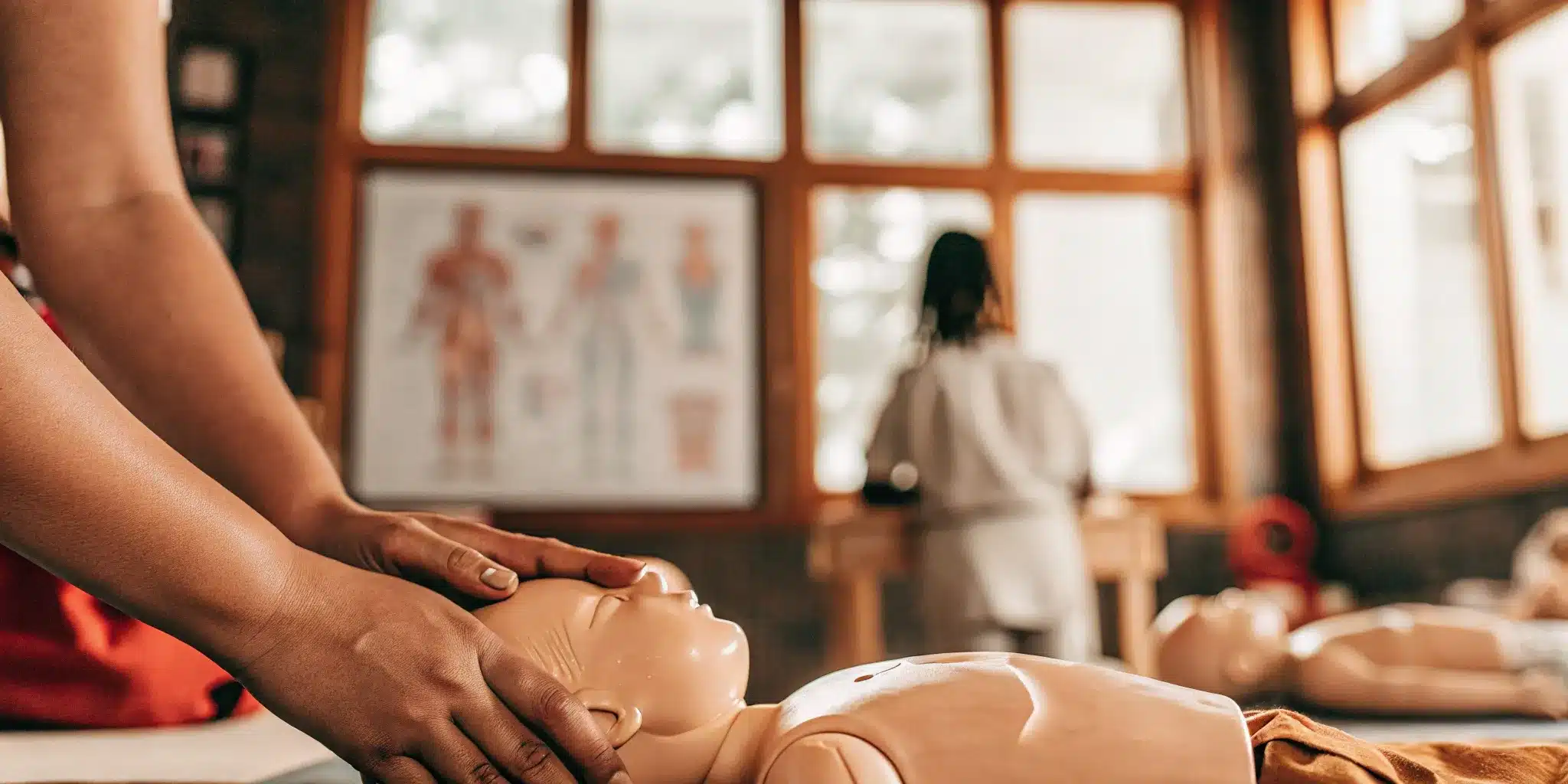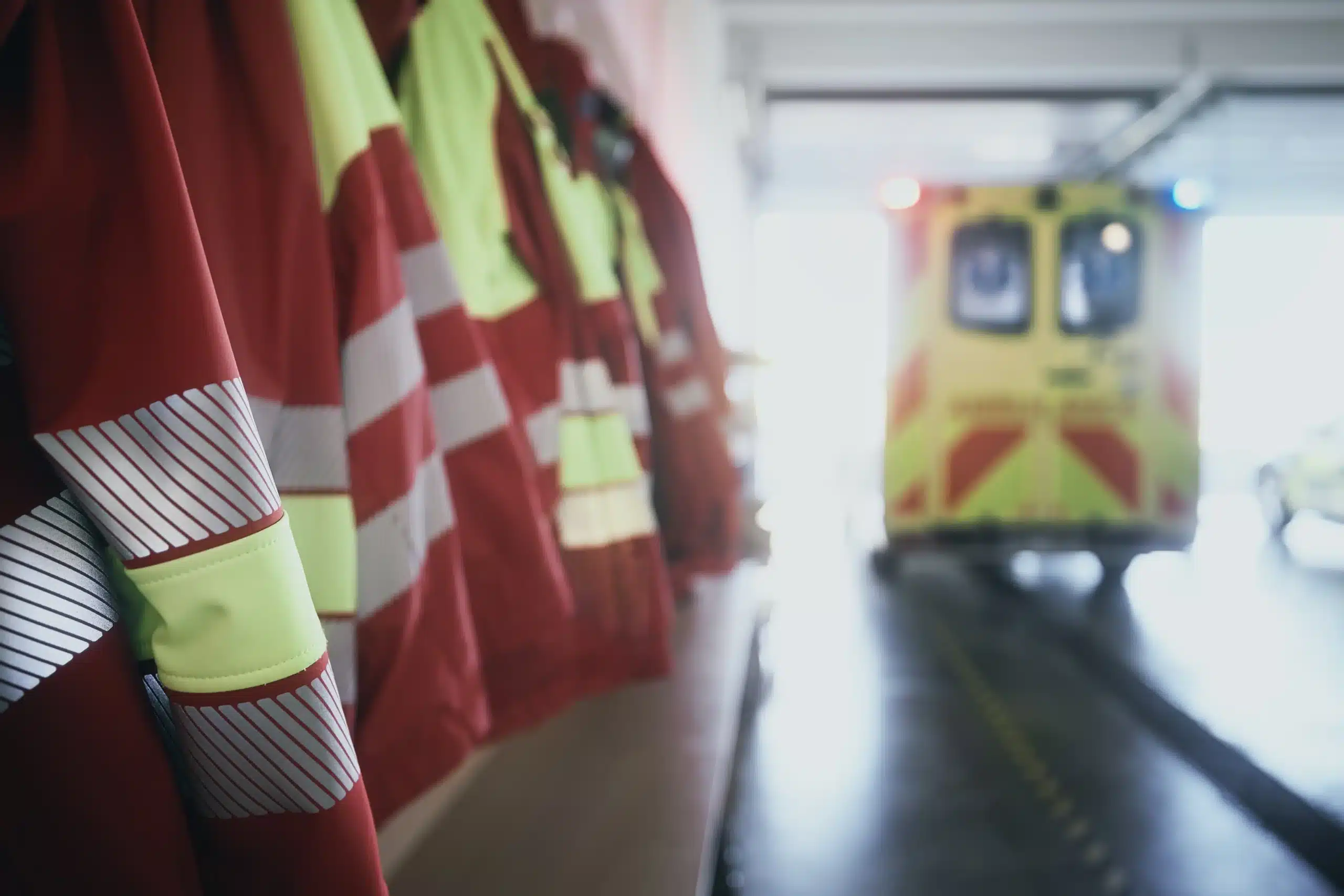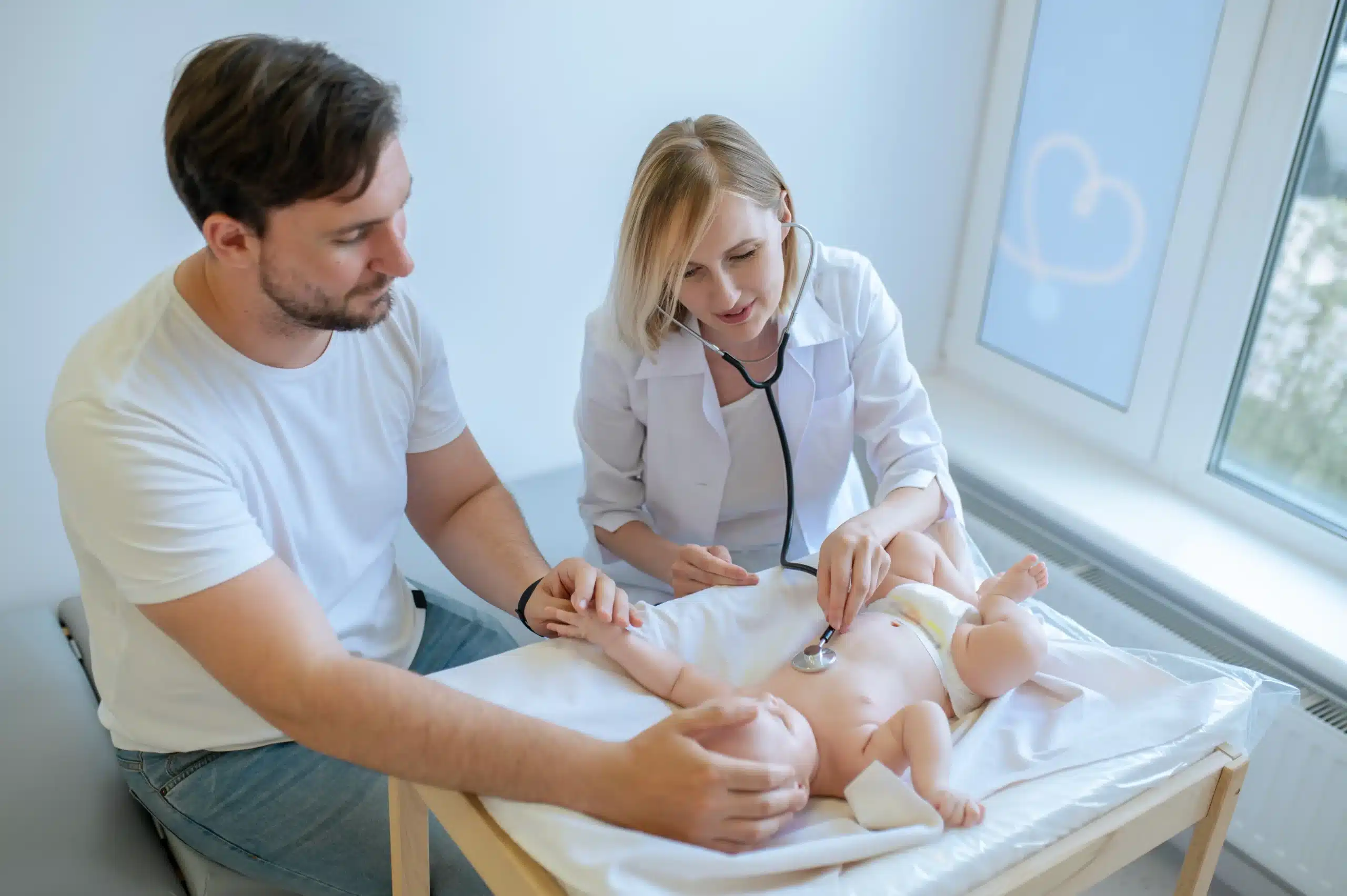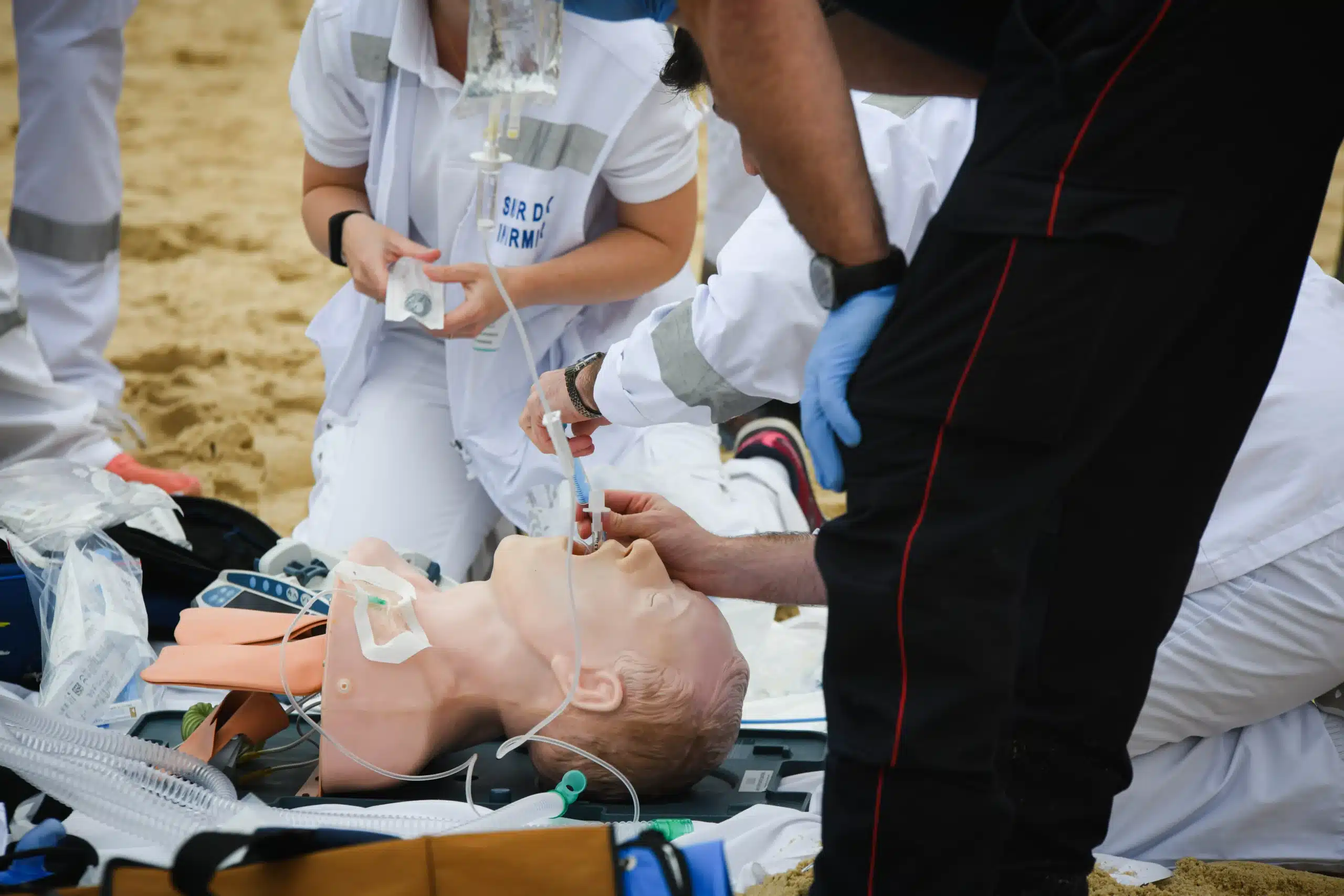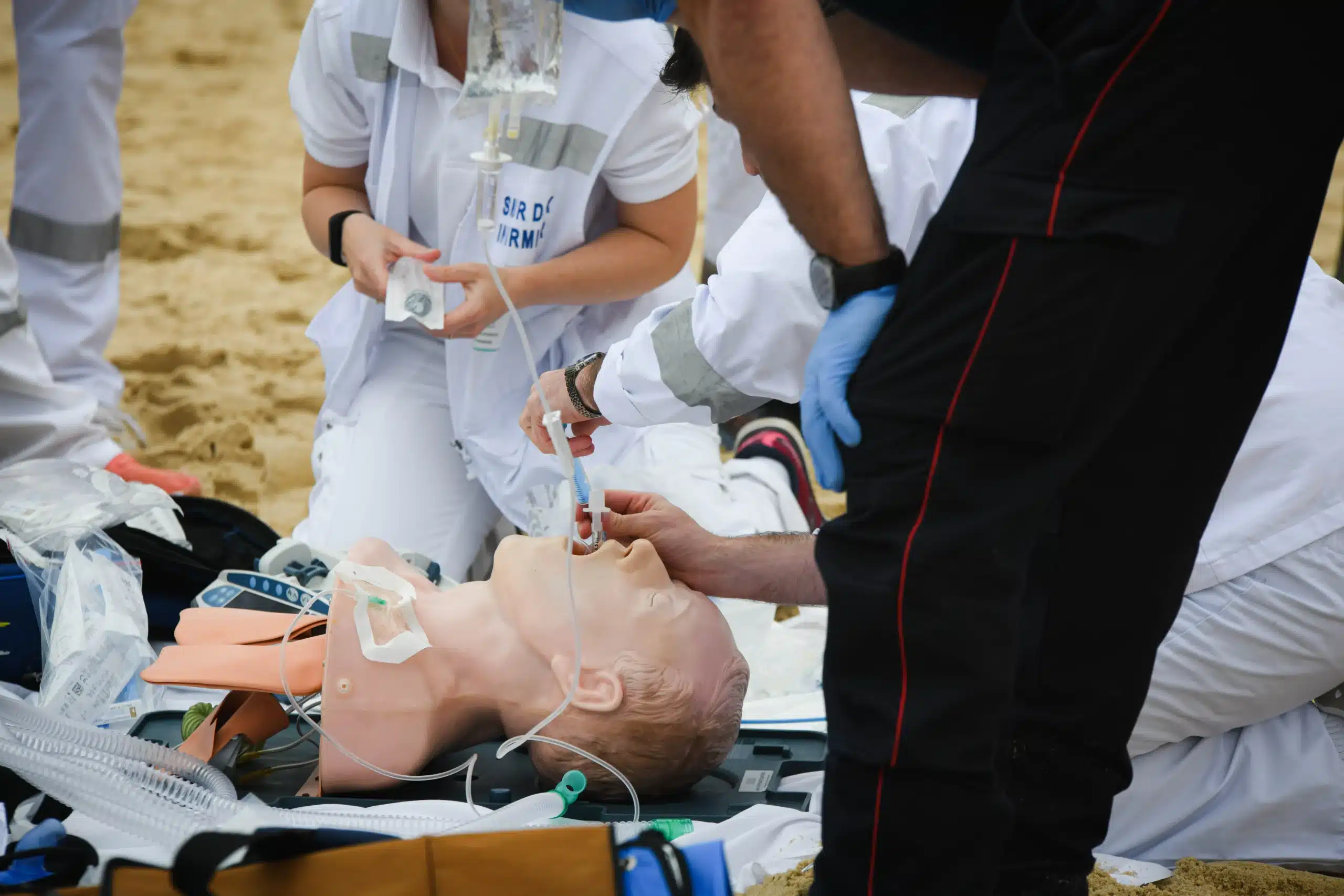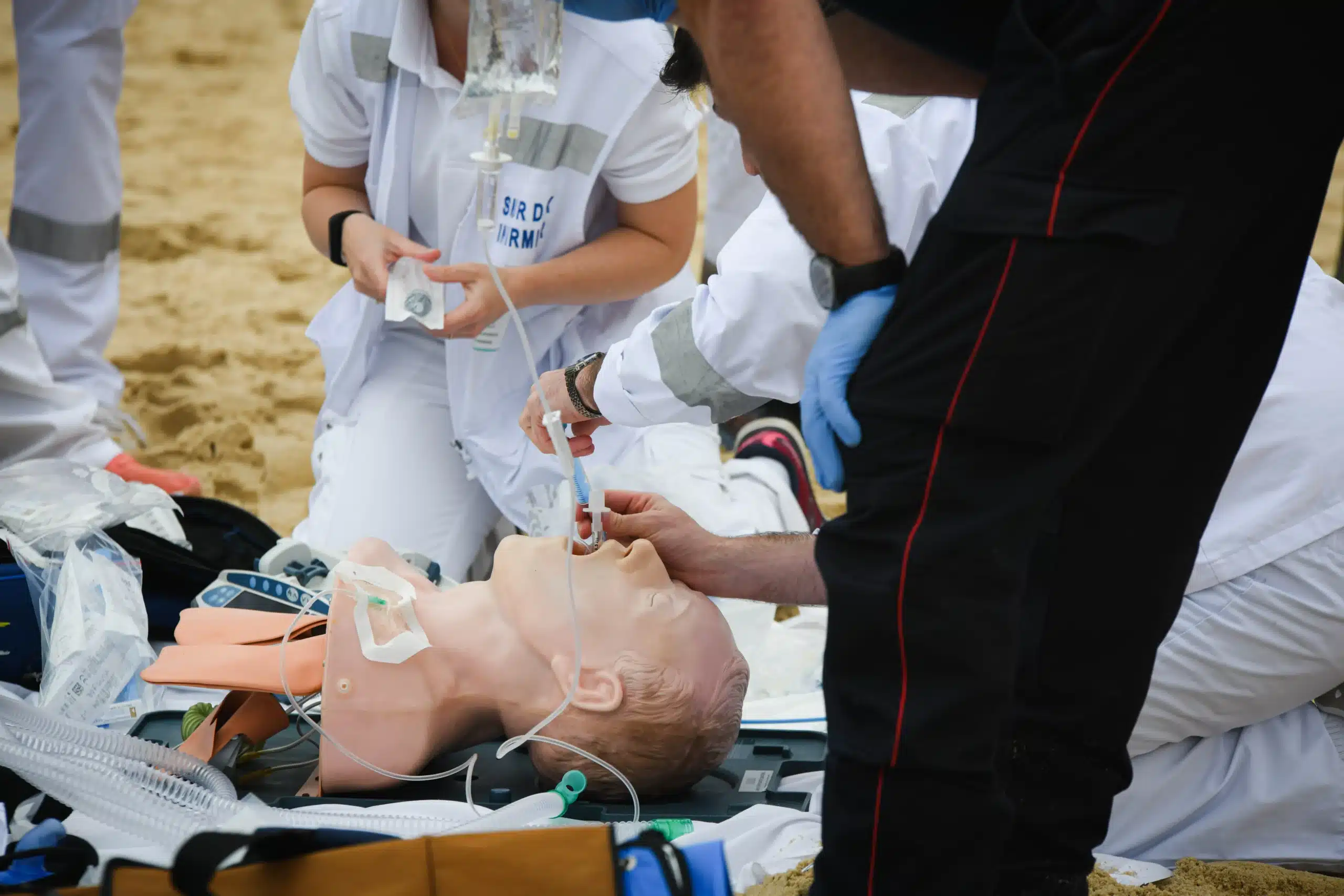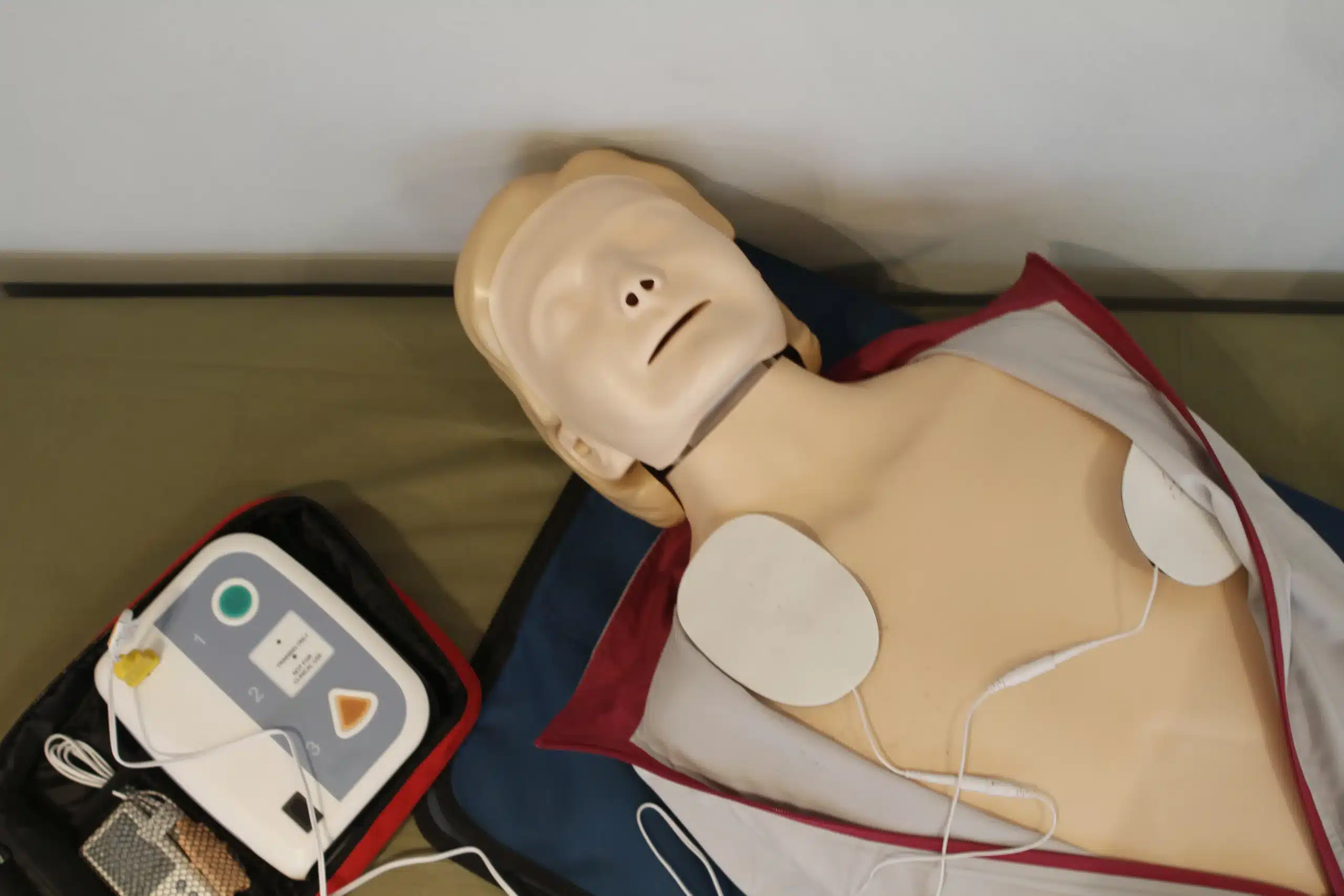Seconds matter in neonatal care. The ability to respond quickly and effectively in an emergency can make all the difference. NRP certification provides healthcare professionals with the knowledge and skills to handle those crucial first moments after birth. This training is not just about learning techniques; it’s about building confidence and fostering teamwork. If you’re a healthcare provider in San Ramon seeking to enhance your neonatal resuscitation skills, this article is your comprehensive guide to NRP. We’ll cover everything from course content and flexible scheduling options to pricing and the benefits of NRP certification in San Ramon.
Key Takeaways
- NRP certification equips you with essential newborn care skills: From airway management to effective team communication, NRP training prepares you to confidently handle neonatal emergencies and contribute to positive patient outcomes. The blended learning format offers flexibility for busy professionals.
- Choosing the right NRP program and provider is essential: Consider factors like class size, instructor experience, and available resources when selecting a program. Look for providers who offer comprehensive training and ongoing support. Compare options in San Ramon and surrounding areas to find the best fit.
- Maintaining your NRP certification demonstrates your commitment to excellence: Stay current with your certification through renewal and continuing education. This ensures you’re always practicing with the most up-to-date knowledge and techniques in neonatal resuscitation.
What is the Neonatal Resuscitation Program (NRP)?
What is NRP and why is it important?
The Neonatal Resuscitation Program (NRP) equips healthcare professionals with the skills to manage newborn emergencies during and immediately after childbirth. It’s the U.S. standard for neonatal resuscitation, reflecting best practices and evidence-based techniques. Earning NRP certification demonstrates a provider’s ability to respond effectively to these critical situations, ultimately contributing to better patient outcomes. This training has been associated with a significant reduction in deaths related to birth asphyxia in the U.S., making it a vital credential for anyone involved in newborn care. The program promotes a team-based approach, emphasizing clear communication and effective leadership during resuscitation efforts. For more information on NRP’s impact and development, visit the American Academy of Pediatrics.
Key skills and topics covered
The NRP course covers essential skills, from basic resuscitation techniques to advanced life support. It emphasizes teamwork and communication in high-pressure situations, empowering healthcare providers to work together seamlessly. The curriculum also develops leadership skills, enabling providers to confidently guide their teams during emergencies. The NRP offers two certification levels: Essentials and Advanced. The Essentials course covers the fundamentals of neonatal resuscitation and is suitable for any healthcare professional involved in newborn care. The Advanced course delves into more complex scenarios and is designed for providers who regularly attend births and manage the resuscitation of newborns with specific risk factors. You can explore the specifics of each course through the American Academy of Pediatrics.
Find NRP Certification in San Ramon
Blended learning: Online and hands-on
The Neonatal Resuscitation Program (NRP) uses a blended learning approach, combining online coursework with essential hands-on training. This format allows you to learn the foundational material at your own pace before practicing the necessary skills in person. The online portion covers key concepts and procedures, giving you a solid base of knowledge. This online learning is then reinforced by hands-on sessions, where you’ll work with experienced instructors to develop proficiency in neonatal resuscitation techniques.
In-person classes and simulations
NRP courses emphasize hands-on learning to build your practical skills. These in-person sessions often involve realistic simulations, allowing you to apply your knowledge in a safe, controlled environment. Working through simulated scenarios helps you develop confidence and improve your critical thinking abilities under pressure. Successful completion of the program, including the in-person training component, earns you a digital NRP Provider certification card, valid for two years, issued through the American Academy of Pediatrics (AAP).
Course overview
Healthcare providers in San Ramon, California, can find NRP certification courses. These courses, often offered by the American Heart Association (AHA), cater to various experience levels, from those just starting their careers in neonatal care to seasoned professionals needing recertification. The curriculum covers a wide range of topics, including the initial steps of resuscitation, positive-pressure ventilation, chest compressions, and advanced airway management. The goal is to equip healthcare professionals with the skills and knowledge to effectively respond to neonatal emergencies.
NRP Course Pricing in San Ramon
Understanding the cost of NRP certification is an important step in choosing the right program. Let’s break down the typical fees, potential discounts, and options for bundled certifications in San Ramon.
Course fees and discounts
NRP course fees in San Ramon vary based on the provider and course format. Expect options ranging from $250 to $300, typically covering online learning materials, the in-person skills session, and your official NRP certification card. Some providers, like San Ramon CPR classes, may offer discounts for students or groups, making training more accessible for those starting their healthcare careers. It’s always a good idea to ask about potential discounts.
Bundled certifications
If you’re looking to expand your skills, consider bundled certifications. Many training centers offer packages that combine NRP certification with other essential certifications like BLS, ACLS, and PALS. For example, Lifework offers several bundled options. This approach can often save you money compared to taking courses individually and provides a well-rounded skill set for healthcare professionals.
Price comparison
Do your research and compare pricing from different NRP providers in the Bay Area. While the average cost is around $280, as noted by Bay Area CPR, prices may differ based on what’s included. Ensure the quoted price covers everything: online access, skills testing, and the certification card. Contact providers directly to clarify any questions about pricing.
Flexible NRP Training Schedules
Finding the right NRP course often depends on having a flexible schedule. Thankfully, providers in San Ramon understand the demands of healthcare professionals and offer a variety of options to fit your needs.
Class frequency and options
NRP courses are offered frequently throughout the month in San Ramon, often with multiple sessions available each week. This increases your chances of finding a class that works for you, rather than rearranging your schedule around limited options. Many providers offer a mix of formats, including traditional classroom learning, blended learning with online components, and even skills-only sessions for those needing a refresher. This variety lets you choose the learning style that suits you best. Some providers, like Lifework Education, offer hybrid options for certifications like BLS, ACLS, and PALS, which could indicate similar flexible scheduling for NRP courses.
Accommodating busy schedules
We get it—healthcare professionals are busy. That’s why NRP training centers in San Ramon work to accommodate various schedules. Whether you’re a seasoned practitioner looking for recertification or new to neonatal care, you can find a program that works for you. If your certification doesn’t require in-person training, explore online options that let you learn at your own pace and from anywhere. This flexibility can be a game-changer for those juggling work, family, and other commitments. Check with specific providers like Safety Training Seminars for their most up-to-date scheduling options. For more information on NRP courses in a nearby city, you can reference NRP classes in San Ramon.
Your NRP Course Experience
Your NRP course experience blends online learning with hands-on practice, culminating in a simulation-based evaluation. This approach ensures you develop both the knowledge and practical skills necessary for neonatal resuscitation.
Online Learning and Preparation
The NRP Essentials course typically begins with online learning. This self-paced component covers the first four lessons of the Textbook of Neonatal Resuscitation and provides a foundation for everyone involved in newborn care. This online portion allows you to learn the fundamental principles of neonatal resuscitation at your own speed before moving on to hands-on training. You’ll study topics like the initial steps of resuscitation, positive pressure ventilation, and chest compressions. This NRP certification overview offers a helpful summary of what to expect.
Hands-on Practice and Simulations
After completing the online modules, you’ll participate in hands-on training sessions. These sessions provide a safe environment to practice essential skills, like airway management and chest compressions, using realistic simulators. Simulation-based training is invaluable for developing muscle memory and confidence in performing these critical procedures. As noted in this report on an NRP program, most participants find the combination of theory and practical skills, particularly the hands-on simulator experience, highly beneficial.
Teamwork and Communication
NRP courses also emphasize the importance of teamwork and communication in neonatal resuscitation scenarios. You’ll learn how to effectively communicate with other healthcare providers during emergencies, ensuring coordinated and efficient care. The Neonatal Resuscitation Program promotes an evidence-based, team-based approach to newborn care, which is crucial for positive outcomes. Simulation exercises often involve working in teams, allowing you to practice these communication skills in a realistic setting. This focus on teamwork prepares you for real-world situations and contributes to research and quality improvement in neonatal resuscitation.
Benefits of NRP Certification
Earning your NRP certification offers a range of benefits, from increased confidence in critical situations to a boost in your career prospects. Whether you’re a seasoned healthcare professional or just starting out, NRP certification demonstrates a commitment to excellence in neonatal care.
Enhanced Neonatal Emergency Skills
The Neonatal Resuscitation Program equips healthcare providers with the skills to handle neonatal emergencies. The NRP course emphasizes an evidence-based approach to newborn care immediately after birth, promoting effective team-based responses. This training covers essential skills such as airway management, chest compressions, and medication administration, empowering you to provide critical care during those first crucial moments. Confidently apply these skills to stabilize and resuscitate newborns, improving their chances of survival and long-term health.
Improved Patient Outcomes and Credibility
Beyond individual skills, NRP certification fosters teamwork and communication—vital components of successful neonatal resuscitation. Simulation-based training allows you to practice these skills in a safe environment, improving your ability to coordinate with colleagues and make quick decisions under pressure. This translates to better patient outcomes and builds trust among team members. Holding an NRP certification also enhances your credibility as a healthcare professional, demonstrating your dedication to providing high-quality care. Patients and their families will feel more confident knowing they are in the hands of a certified NRP provider.
Career Advancement
In the competitive healthcare landscape, NRP certification can significantly enhance your career. NRP certification validates your expertise in neonatal resuscitation, making you a valuable asset to any neonatal care team. It can open doors to new opportunities, specialized roles, and leadership positions. Many healthcare facilities require NRP certification for certain positions, so obtaining this credential can be a prerequisite for career growth. It also demonstrates a commitment to continuing education and professional development, further strengthening your resume and career prospects.
Maintain Your NRP Certification
Keeping your NRP certification current is key to providing the best neonatal care. This section covers the renewal process and how to stay up-to-date with the latest advancements in the field.
Renewal and Recertification
NRP certification is valid for two years. To renew your NRP Provider eCard, you’ll need to retake the online assessment and participate in another instructor-led event. This ensures you’re keeping your skills sharp and your knowledge fresh. The American Academy of Pediatrics offers resources for NRP Providers, including information on renewal requirements. This two-year cycle helps maintain the high standards of neonatal care. Think of it like a regular check-in to confirm you’re practicing with the most current guidelines.
Continuing Education
Continuing education is crucial for staying at the forefront of neonatal resuscitation. The NRP program offers continuing education credits, with the specific number varying based on the certifying organization. For example, Certified Nurse Midwives can earn up to 9 hours of Category 1 credit through an NRP course. These credits demonstrate your commitment to ongoing learning and professional development in neonatal care. Staying informed about the latest techniques and best practices will help you confidently handle any situation. The NRP program offers a variety of course formats and levels to fit your needs and experience, combining online learning with hands-on practice. This blended approach ensures you develop both the knowledge and the practical skills necessary for effective neonatal resuscitation.
Choose the Right NRP Provider
Finding the right Neonatal Resuscitation Program (NRP) provider is key for a successful learning experience. Several factors contribute to a positive and effective training environment.
Factors to Consider
When selecting an NRP provider in San Ramon, consider the range of courses available. The American Heart Association (AHA) designs NRP courses to suit various healthcare providers, from beginners to seasoned professionals seeking recertification. Look for a provider that offers the specific training you need. Also, think about class size and the instructor-to-student ratio. A smaller class often allows for more individualized attention and feedback. Location and scheduling flexibility are also important. Choose a provider with convenient class times and an accessible location. Finally, consider the overall learning environment. Does the training center offer a comfortable and well-equipped space?
Accreditation and Qualifications
Ensure your chosen NRP provider holds accreditation from reputable organizations like the AHA. This ensures the program meets established standards and guidelines. Check the instructors’ qualifications. Are they experienced healthcare professionals with a strong background in neonatal resuscitation? A provider affiliated with a respected institution, like a hospital or medical center, can offer additional advantages, such as access to advanced equipment and resources. For example, the CPR Training Center of Concord offers AHA Advanced Cardiovascular Life Support courses.
Post-Certification Support
Continued learning is essential after you receive your NRP certification. Inquire about the post-certification support offered by the provider. Do they offer refresher courses or continuing education opportunities? Access to online resources, like practice scenarios and updated guidelines, can be valuable for maintaining your skills. Simulation-based training is another important aspect of ongoing skill development, allowing healthcare providers to practice teamwork and communication in a realistic environment. This bridges the gap between theory and practice. A provider who emphasizes post-certification support demonstrates a commitment to your long-term success.
NRP Training Providers in San Ramon
Finding the right Neonatal Resuscitation Program (NRP) provider is key to a successful training experience. Here’s a look at some options in and around San Ramon:
Safety Training Seminars
Safety Training Seminars, a trusted provider of BLS, ACLS, and PALS certification, doesn’t currently have NRP training listed on their website. However, given their comprehensive curriculum and commitment to low prices, reaching out to them directly about potential future NRP courses or recommendations is worthwhile. If you’re already considering other certifications with them, inquiring about NRP training could be beneficial.
Project Heartbeat (Rescue One Training for Life)
While not located in San Ramon, Project Heartbeat, in partnership with Rescue One Training for Life, offers a comprehensive NRP program for healthcare professionals. Their curriculum focuses on equipping providers with the skills to manage neonatal emergencies, making it a valuable option if you’re willing to travel outside of San Ramon.
Lifework
Lifework, formerly HeartShare Training, has a CPR training center in San Ramon offering various certifications, including BLS, ACLS, PALS, and NRP. Their convenient location makes them a practical choice for those seeking NRP training in the area.
Bay Area NRP Courses (Safety Training Seminars)
Bay Area CPR, affiliated with Safety Training Seminars, provides NRP classes and renewals in nearby locations like San Francisco, Concord, and Milpitas. Their blended learning model, combining online learning with hands-on skills testing, offers flexibility. They also have a price-match guarantee for comparable NRP courses, making them a competitive choice if cost is a factor and you’re open to training in a nearby city.
Prepare for NRP Certification
Getting ready for your NRP certification involves a few key steps. From studying effectively to knowing what to have on hand during the course, preparation sets you up for success. Here’s what you need to know:
Study tips and resources
The NRP Provider course has several components: an online exam, skills evaluation, and simulations with debriefing. The American Academy of Pediatrics (AAP) recommends two course formats, one for Essentials learners and one for Advanced learners. Make sure you understand the requirements for your learning track. Simulation-based training is a core part of NRP certification, offering valuable practice in teamwork and communication—essential skills in neonatal resuscitation.
What to bring
Come prepared for your NRP course. You’ll need your textbook during the online portion, so be sure to purchase it beforehand.
Post-certification steps
After you complete your NRP course, you’ll receive an eCard valid for two years. To maintain your NRP Provider status, you’ll need to renew your certification every two years by completing the online assessment and attending another instructor-led event. The skills and knowledge you gain during NRP certification are crucial for effective teamwork and communication during newborn resuscitation, so staying current with your certification is essential.
Related Articles
- NRP Classes in Pleasanton, CA – Pleasanton CPR Classes
- Pleasanton CPR Training: A Complete Guide – Pleasanton CPR Classes
- Why CPR is Important in Healthcare – Pleasanton CPR Classes
- First Aid Classes in Pleasanton: Your Guide – Pleasanton CPR Classes
- Life-Saving Workplace CPR and First-Aid Training
Frequently Asked Questions
What is the difference between the NRP Essentials and Advanced courses?
The Essentials course provides a foundational understanding of neonatal resuscitation and is suitable for all healthcare professionals involved in newborn care. The Advanced course builds upon this foundation, exploring more complex scenarios and management strategies for newborns with specific risk factors. It’s designed for providers who regularly attend births and lead resuscitation efforts.
How often do I need to renew my NRP certification?
NRP certification is valid for two years. Renewal involves completing the online assessment and participating in an instructor-led event. This ensures your skills and knowledge remain current with the latest guidelines and best practices in neonatal resuscitation.
What if I can’t find an NRP course that fits my schedule?
NRP providers understand the busy schedules of healthcare professionals and offer various course formats and schedules. Explore options like blended learning, which combines online coursework with in-person skills sessions, or skills-only sessions for those needing a refresher. Contact providers directly to discuss your scheduling needs and explore available options.
Why is simulation-based training so important for NRP certification?
Simulation-based training provides a safe and controlled environment to practice essential neonatal resuscitation skills. It allows you to apply your knowledge, develop muscle memory, and build confidence in performing critical procedures under pressure. It also emphasizes teamwork and communication, vital components of successful resuscitation efforts.
How can I find a reputable NRP training provider in my area?
Look for providers accredited by reputable organizations like the American Heart Association (AHA). Check instructor qualifications and experience, and consider factors like class size, location, scheduling flexibility, and the overall learning environment. Inquire about post-certification support, such as refresher courses and access to online resources. Don’t hesitate to contact providers directly to discuss your specific needs and preferences.
